THE TRACK THAT RUNS THROUGH LIFE
Several of my dreams are characterized by movement. I am enclosed by train compartments, boat cabins, or aircrafts. Often, I have forgotten something, the ticket has been lost, the luggage has disappeared, or I have ended up on the wrong train, plane or boat. When I wake up I sometimes do not know where I am. I look around. Am I inside a room, or a train compartment? A cabin or a cell? Am I in Rome, Stockholm, Santo Domingo, or Hässleholm? Am I alone, or is someone sleeping next to me?
I was born by a railway junction - Hässleholm, a small town that grew up around railroad tracks. Trains have from time to time been part of my life. During high school, I spent the evenings loading baggage cars with packages and later I went with my mates by train throughout Europe. While I studied at Lund University, I worked as waiter on trains bound for Stockholm. Since then I have flown back and forth over the Atlantic Ocean, across Latin America, Asia and Africa.

In my dreams, loudspeakers are echoing, announcing arrivals and departures. I am heeding towards adventure, or back home. Where it may be? Travel has become a mental state in which I find myself within a liminal existence, where I have time for reflection and may suffer from bad conscience for what I have done or neglected to do. What awaits me? What am I travelling from? What am I travelling towards? The allure and curse of voyages. The future? Where might it be? A journey to nowhere. An escape? A return?

End or beginning? Like so much else that swirls around in my brain thoughts about travel become illustrated by pictures I have seen and been influenced by. On the cover of one of my novels is a detail from a painting by William Turner: The Fighting Temeraire tugged to her last berth to be broken up. A picture of an era entering its tomb, created by an artist who at the same time was a forward-looking modernist and a traditional romantic. HMS Temeraire was a ship turned into a symbol of Britain's power over the seas. Its captain´s and crew's brave behaviour during the Battle of Trafalgar was of such a crucial importance that their vessel became legendary and almost regarded as a person. In Turner's painting the huge sailing ship is by a steamer towed across a darkening sea, while the sun rises below a romantic display of exuberant colours.
A new dawn is breaking into a romantic fairy-tale world, as when the German Biedermeier Meister Carl Spitzweg in a small painting depicts how a fairy tale dwarf from the mouth of his cave contemplates a locomotive chugging through a valley.

Another painting by William Turner, created five years after Temeraire, indicates the amazing power of a new means of transport. Rain, Steam and Speed depicts how a steam locomotive of the model Firefly in a violent storm pushes forward over the newly built Maidenhead Bridge, just outside of London. The year is 1844, and the locomotives were already able to attain a speed of 100 kilometres per hour.

It is not strange that the mighty steam locomotive was becoming a common motif of artists who tried to capture not only their impressive power; how they with full force penetrated and altered the cityscape, as in Monet's smoke-filled, atmospheric depictions of the Gare Saint-Lazare, but they also tried to turn them into symbols of changes in human mentality, like the futurist painter Umberto Boccioni how used trains to represent different states of mind.

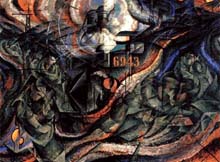
The fact that several of my character building years took place close to trains might have made me susceptible to all sorts of depictions of these remarkable machines. When I a few years ago used to visit Musée Marmottan in Paris, I became especially fascinated by Monet's painting Train in Snow. In it I recognized the heavy, dark sky, the bare, black trees, the white-greyish, wet snow, the train that is about to leave while its lanterns light up the gloom. Looking at it I remember the smell of smoke and night and imagine I can recall the sound of the locomotive steaming up and its whistle signalling departure.

Maybe it is because I have for many years in the evening darkness worked with collecting and delivering mail to and from train carriages, or since my work as a waiter in dining cars forced me to board trains early in the morning that I am captivated by paintings depicting nocturnal train yards.

And then there is of course the delightful feeling of adventure when trains bring us into the world, scampering through strange areas - forests, swamps, big cities and high mountains. Bringing to mind the monumental efforts required for putting down the tracks and construct tunnels and bridges in remote jungles and through almost inaccessible mountain ranges.

Travel means change, rhythm and movement, like blood orbiting through the body or the relentless aging of mind and body. The metallic wheels´ rhythmic thumping against the rails. The forceful inebriation by steam, locomotives and rails are present in Filippo Tommaso Marinetti´s famous celebration of speed and machines in his futuristic manifesto of 1909, a few years before the horrors created by machines of mass destruction were demonstrated in the hell of the First World War´s blood drenched trenches:
We shall sing of [...] the pulsating, nightly ardour of arsenals and shipyards, ablaze with their violent electric moons; of railway stations voraciously devouring smoke-belching serpents; of workshops hanging from the clouds by their twisted threads of smoke; of bridges which like giant gymnasts, bestride the rivers, flashing in the sunlight like gleaming knives; of intrepid steamships that sniff out the horizon; of broad-breasted locomotives, champing on the wheels like enormous steel horses, bridled with pipes, and of the lissom flight of the aeroplane whose propeller flatters like a flag in the wind, seeming to applaud, like a crowd excited.
It was not the stranglehold of modern life on imagination and openness that Marinetti focused on, but progress, power, light and openness. Certainly, he was capable of bursting out in distasteful tributes to violence, war and misogyny. However Marinetti was, like Mussolini, who he supported but often quarrelled with, a poseur who happily blurted out words and ideas with an avowed purpose to shock.
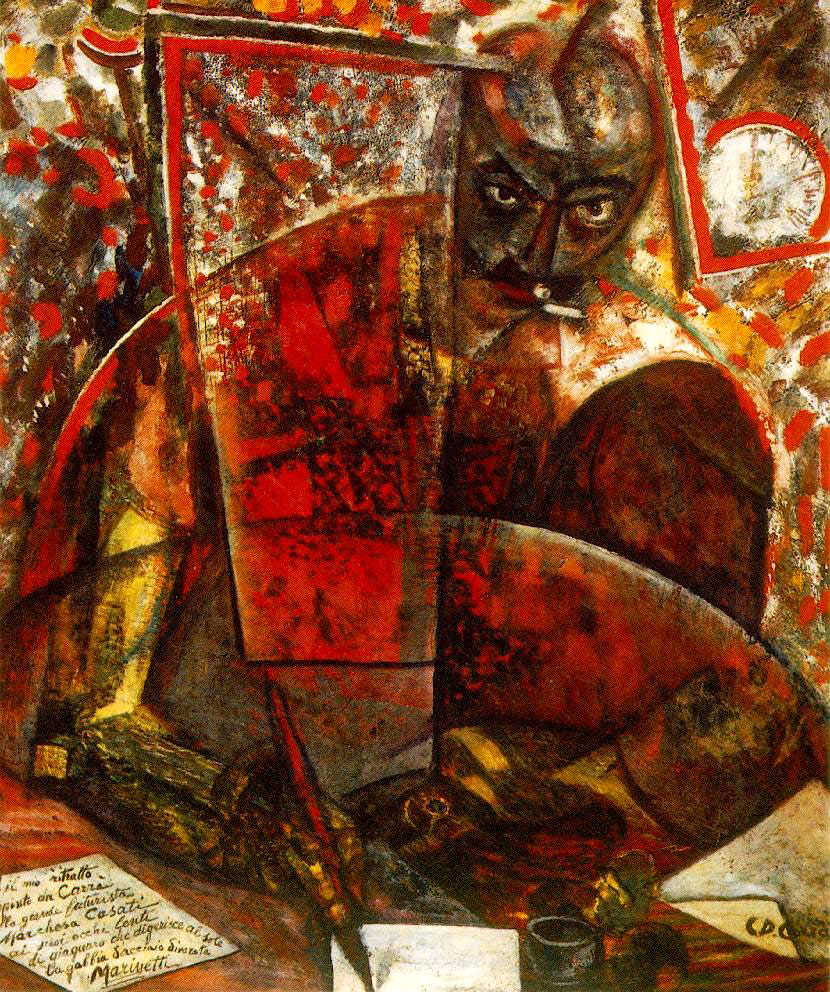
In fact, Marinetti supported women's suffrage and spoke warmly of women´s suppressed expressive powers. He hated and despised Hitler and Marinetti´s unpleasant tributes to war´s “invigorating powers” made him, unlike many other desktop revolutionaries, to take active part in it. He was wounded at the front in the First World War and in the other one he participated as a volunteer on the Eastern Front, where he, despite his sixty-seven years fought directly at the front line.
Marinetti was obsessed with his own virility, something that made him defining himself as "Europe's caffeine" and a powerful seducer of women, demonstrated by his self-biographical Como si seducono le donne, "How to seduce women". But, like his predecessor Giacomo Casanova, Marinetti assumed that no woman would be worthy of being seduced by a man of his calibre if she was not independent and intelligent. Accordingly, he pleaded for women's equality and the elimination of "male legal rights over women", proclaiming that women must have equal rights to divorce, child care and education and of course the right to vote, receive equal pay and a free choice to perform any kind work.

A similar passion made Marinetti to constantly declare that the thrill of warfare brought forth male vitality. When he during World War I took part in the fierce fighting in Gorizia, on the border of what is now Slovenia, he glorified battles as male self-assertion and resembled bomb explosions to “erect penises".
Marinetti´s approach to race issues, which came to a head in 1938 when Mussolini introduced anti-Semitic laws, was characterized by a similar militant virility. The futuristic group he headed was the only Italian organization that openly attacked officially sanctioned racism and declared that as independent artists they were unable accept that considerations about race could be allowed to limit cultural expression. Marinetti´s aversion to racism was partly a result of his anger over Nazi condemnation of the modern art he represented as a symptom of "Jewish decadence" and partly due to the fact that several of his closest friends were Jews. Not least his much admired Antonio Sant'Elia, a ground-breaking architect who twenty-eight years old had been killed at a front section where Marinetti had been severely wounded during the First World War. Below, the moustachioed Marinetti can be seen together with Sant'Elia and the genial futurist artist Umberto Boccioni, who thirty-four years was killed at the beginning of the war.

At a meeting in Rome where artists protested against the racial laws Marinetti entered the stage with a loaded machine gun, which he laid on the table in front of him while he pleaded for tolerance and the unconditional freedom of artistic expression. Unfortunately, such convictions did not hinder him from joining Mussolini's scandalous Nazi puppet regime in Salò. Although Marinetti remained largely faithful to Fascism almost to the bitter end, he died of a sudden heart attack in 1944, he was nevertheless a convinced democrat.
Already in the early 1920's he renounced his membership in the Fascist Party, which he considered to be far too conservative for his taste. Among Marinetti's political opinions were free, state-funded and compulsory education for all and guaranteed well-being for every citizen, which according to him ought to be funded through the sale of Italy's art treasures. When someone remarked that it would deplete Italian culture, he replied: "On the contrary, it would disseminate it around the world, while our nation would become richer and happier, meaning that we will be capable of producing better art and culture".
Fascism ended in disaster, slaughter and murder. The tributes paid to movement, change and modernization by so many totalitarian systems usually end up in total tragedy for everyone involved; perpetrators as well as victims. Such propaganda easily seizes individuals, but generally results in a fruitless search for something that is never reached or saturated.
Songs of sirens, immortalized through the tale about the role model for all adventurers - Ulysses, who adrift and cursed by the gods once listened to the sirens' song and thus became imprisoned by the allure of traveling. Dante met him in the Inferno where Ulysses was encased within a flame and eternally tormented by a search for something beyond his reach.
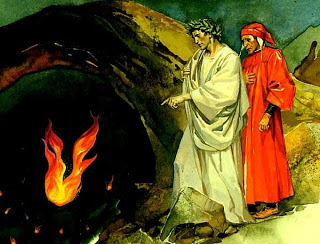
I am far from being a Ulysses. I generally adapt myself to where I happen to end up and tend to feel at ease there. Now I live in Rome, but I have other homes in Bjärnum and close to San Pedro Macoris. I have no fixed job and feel threatened by an uncertain future, but I have my family, good friends and my memories. In my dreams loudspeakers announce: "The train to Berlin will arrive on track four!", "Flight SK 204 to Bogota arrives at gate No. 4". I listen and obey, willingly I step aboard, anxious, with expectations, or relieved. What may be expected? The serenity behind everything? The meaning of life? A final togetherness - perfect love, attachment to loved ones, a harmonious family life?

When I almost fifty years ago sat in a mail truck on the station platform in Hässleholm, waiting for the arrival of the last train to Ånge, expected shortly after ten o'clock in the evening, the heart swelled in my chest when the Berlin Express made a brief stop, followed by thunderous, clanking freight rains, which carts carried attached notes informing where they came from, or where they were going - Paris, Berlin, Belgrade, Athens. I have since then often associated nights with the railway. The flurry of activity in the yellow glow of lamps, the smell of iron against iron, wood, metal and oil. But also - sometimes - a strange stillness in moonlight and electric lighting.

Hässleholm, a rather boring little town, has its existence to thank for the Swedish Main Line, which in 1855 began to be built in Malmö in the south, until it in early 1894 reached Boden in the far north, after which the hardy navvies spread around the globe. Some of them died from tropical fevers while they laid down rails in the jungles of the Amazon, or the Congo.

Despite its sleepy provincialism Hässleholm harboured two regiments, which lent an adventurous spirit to my childhood. Quite often heavy, battle tanks thundered over the cobblestones outside our windows. One time, a young recruit was beheaded by the railway bridge that ran across the street a few hundred meters further down from our apartment building. The soldier had served as lookout by the open door on the tank's gun turret, but had looked in the wrong direction and not seen the sharp concrete edge of the viaduct, which tore off his head, it was in any case what my neighbour Roland told me. His father was a non-commissioned officer at T4, where he worked as a physical health instructor.

I did not really trust Roland, who was good at dramatizing life and had an impressive collection of toy soldiers, which we used to play with in his room, or out in the yard´s sandbox. Among Roland´s soldiers from World War II was a figurine I would have liked to own, it was a soldier with a flame thrower spraying a dramatic blaze of multi-coloured fire. Roland told me that such hellish weapons were used to incinerate soldiers, who had been trapped inside concrete bunkers. However, I was most impressed by a Frenchman wearing a blue uniform and riding a camel.
Sometimes we took our bikes to the regiments´ training grounds. It was of course forbidden, but that only increased the feeling of adventure and after having crawled under barbed wire, swinging by the arms across water-filled ditches and with thick ropes trying to climb up impossibly steep plank walls, we rested in a sand pit where Roland told us how he had seen the beheaded soldier's head roll across the cobble stones, or how it was when a guy from a neighbouring apartment building had been severely burnt and taken by ambulance to the hospital after peeing on a high voltage line from a railway bridge in another part of town.
The railroad ran through my childhood. The impressive station building was the town's centre. The station clock regulated my time and trains rattled through my dreams. Twice a year the train brought me, or the entire family, to Stockholm where the king and my grandfather lived, his lush garden was a fairyland that has followed me through life. And from the station you could travel even further afield - to Berlin, Prague, Paris and Rome. Sitting by my school bench, I could through the dusty window, see how wagon lits moved down to the continent. At dusk, we could bike down to the train yard and sneak into unlocked compartments, soaking up lingering scents of cleaning agents, metal, dusty seats, as well as the aroma of perfume and tobacco and stench from unknown travellers, whiffs from distant, alluring worlds.

On hot summer days we wandered kilometre after kilometre along tracks taking us through forests and across fields, far beyond roads and highways. We ended up in the middle of nature, where plants and animals were closer to us than elsewhere, where the scents of trees and plants, mixed with the smell of tarred sleepers and the sun-baked stones of the embankment, the heat made the rails shimmer. Accompanying us was the constant threat of the sudden appearance of a train and like the Sioux we had seen on Sunday matinees, we pressed our ears to the hot rails to perceive the singing, swaying sound of approaching locomotives with their trail of thunderous, rattling passenger cars.
Behind passing windows we caught glimpses of elegant ladies we imagined were heading towards Berlin night clubs, fashionable Parisian restaurants or the casino in Monte Carlo, or young men with tickets to vibrant cities, or busy ports, where ships were waiting to take them across the seas to scorching deserts, soaring mountains and deep jungles. The trains disappeared and again we could hear birdsong, the mooing of cows, or a distant dog barking. All around us was summer, with drifting clouds over a clear blue sky.

In Vietnam I have seen mighty locomotives with red flags fluttering by their fronts, steaming through emerald green rice paddies, while white smoke billowed above them. In Latin America and Africa I have encountered overgrown railway tracks with rusting steam locomotives, covered with meandering vines, making them resemble the remains of dinosaurs. In Peru and Bolivia I have in overcrowded train compartments been sitting on wooden benches, while puffing locomotives laboriously pulled us forth between snow-capped peaks.
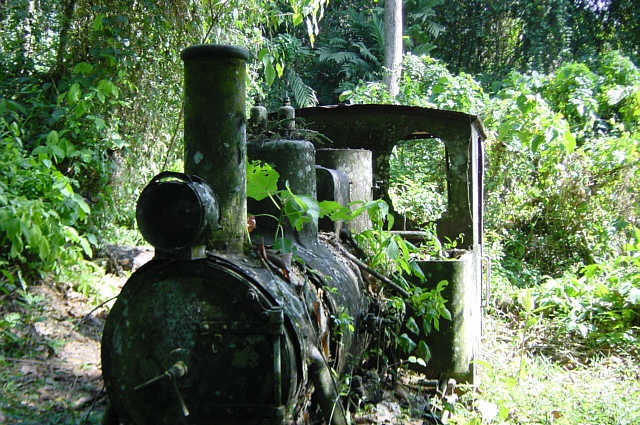
In New York we lived not far from Grand Central Station's gilded palace and in Rome not far from Stazione Termini´s elegant fascist structure. At stations in Hamburg, Berlin, Paris, Budapest and London I have been sitting on benches listening to bellowing loudspeakers and watched magnificent, grimy glass domes resting on slender iron columns. How different this is from all hours I have spent snoozing on uncomfortable vinyl seats, surrounded by tax-free shops within impersonal and almost identical airport hangars.
With money in our pockets from various odd jobs, I and Claes boarded a train in Hässleholm, the day after we had been demobbed after a year of obligatory military service. We went directly to Sicily, as far south we could come by train. Since then, I and my friends travelled south by train every summer. A lovely time, characterized by adventure and broadening horizons. Perhaps the reason for my life becoming what it became is that I was born in a small town by railroad tracks stretching into the world. With all it entailed of dreams about work and travelling. It cannot be denied that my memories of and experiences from travelling are numerous and constantly nourish my imagination.

Man is a migrant animal. Many of us have a desire, or compulsion, to move from place to place. Nevertheless, I cannot determine whether that is the case with me. I enjoy most places where I ended up and have rarely had the time or opportunity to think about why I constantly am moving around as I do. As I sit here and write my gaze falls on a bookshelf. Most books seem to be about travel; Canterbury Tales, The Divine Comedy, Don Quixote, Journey to the West, Pilgrim's Progress, Treasure Island, Moby Dick, Pinocchio, Lord Jim, Adventures of Huckleberry Finn, Journey to the Centre of the Earth, Nils Holgersson´s Wonderful Journey through Sweden - travels, travels.
However, not all trains bring us adventure, or are home bound. Trains can be intimidating and dangerous. While we are standing by a level-crossing barrier watching a mighty train rushing past, we understand that its power can kill, its progress is out of our reach and influence. Trains follow their regular routines, their timetables, their permanent track and they do it at a dizzying speed, with mechanical efficiency, and if they would derail the consequences are terrible.
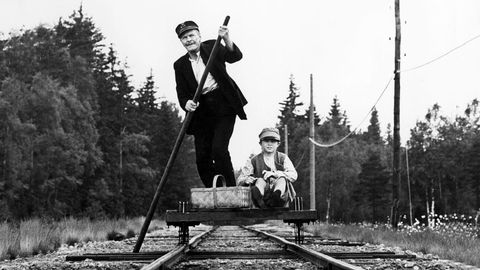
The Swedish author Pär Lagerkvist has in a short story managed to describe how a childhood confrontation with a train unexpectedly revealed the relentlessness of life. In the company of his father, a confident and calm station master who knew his trains and their personnel, the ten year old Pär had been out on adventures in his father's childhood forests. As they walked along the embankment, the father had beforehand known when trains were expected and in good time he had stepped aside with his son and together they had waved to the people passing by, recognizing every driver of the mighty steam locomotives. Protected by his reassuring father little Pär felt confident and proud. Nevertheless, when night falls everything becomes different and threatening, but the trustworthy father declares that his son has nothing to fear from the darkness – he and God is with him. However:
When we found ourselves in a curve of the track, we suddenly heard a commotion behind us! Frightened we woke up from our thoughts. Father pulled me abruptly down from the embankment, into the abyss and kept me there. The train plunged by. A black train, with all its cars extinguished, it passed us at a breakneck speed. Where was it destined? There would be no train passing now! Alarmed we watched it pass. Fire blazed inside the oven of the huge locomotive, blackened men shovelled coal into it, embers flew wildly into the night. It was horrible. The driver stood pale, motionless, with petrified features, illuminated by the fire. Father did not know him, did not know who he was, he just stared straight forward, it was as if he for no reason headed into darkness, deep into the darkness, which had no end. Excited, panting with anxiety, I stood and looked after the wild sight. It was swallowed by the night. Father took me back up on the railway embankment, we hurried home. He said:
- Strange, what kind of train was that? And the driver, I did not recognize him.
Then he just went silent.

It was one of those terrible moments that may transpire in our childhood, when we like a slap in the face suddenly are confronted by a brutal reality and realize that our existence will change for ever. After a day of closeness with his admired father Pär realized with sudden fear that he would eventually live a life of his own, far from his father's safe, well-known and organized existence. He would be callously thrown into an unknown future. The violent onrushing train was a portentous omen:
I sensed what it meant. It was the anxiety that would come, everything unknown, which Father did not know anything about, from which he could not protect me. What would this world be like? What would my life become? Surely not like Father´s, where everything was safe and reliable. There was no real world, nobody really lives a true life. I felt like burning inside, heading into a darkness with no end.
There are trains with horrific final destinations - Auschwitz, Treblinka, Kolyma or Norilsk. The trains may take us home, or to the freedom, but sometimes they bring us to death and suffering. Taking soldiers to slaughter fields, prisoners to hunger, desperation and death.
One evening in Hässleholm, while I was in a yellow mail truck reading and waiting for the train to Ånge to arrive, I saw one of the large, orange RC-locomotives. People came running with rags and buckets, while two train drivers staggered out onto the platform. One of them immediately left the platform, while the other leaned against one of the pillars that supported the platform roof and lit a cigarette.

Men dressed in white, long coats and rubber gloves collected substance from the front of the locomotive and placed it in red, plastic buckets. Curious I stepped out of the mail truck, but before I reached the RC-locomotive the smoking engine driver called upon me:
- You, boy! Yes, you there, come over here for a while.
I walked up to the driver, who shook a cigarette out of the pack and passed it without a word it to me. I politely declined his offer:
- No, I do not smoke and I if smoke a cigarette there will surely be more of them.
The driver laughed:
- You are obviously a good kid, and because of that you should not go over there.
- Why not?
- They pick up the remains of two old grannies we hit just outside of Tyringe. A sharp turn and suddenly they were there, quite unexpectedly, right out of the woods. They came chatting as old ladies do. I blow the alarm, to no avail. There was blood all over the windshield, I could hardly see a thing.
Shaken, I wondered:
- Are not you shocked?
- When you run into something with full speed not much is left. Some bone chips and meat scraps, that's all.
- But, do you not think it was horrifying? Why did you not leave together with your friend?
- Sure, you become jittery when such a thing happens to you. It is nothing I wish for my worst enemy. But, for me it was not the first time. It was worse for Stig. He has not been through it before.
- Stig?
- My colleague, they took him to the hospital. To get him something soothing.
He nodded towards me:
- Sure, it's bloody awful. But, you get used to it. For example, it´s hell to drive through a herd of reindeer. Visibility goes to hell, it´s unrelenting slaughter, guts and blood all over.

He paused briefly as he took a deep inhale from the cigarette before putting it out on the ground. He continued:
- This time it was a couple of grannies, certainly I think more about them and their families than I think about some damn reindeer. It´s bad. Very bad. The only way to overcome such an event is driving on as soon as possible. Hope they have a new shift for me, then I will go home and sleep. I live in Alvesta.
Yes, life´s journey is long and remarkable. The train stops at a station. You do not get down and out, knowing you have not yet reached your final destination. I have lived in many places, traveling from place to place. Sometimes I have imagined that I have arrived - this place suits me fine, here I would like to stay. However, the train continues on its constant trek and I stay on board. There is always a destination. Or – I decide that this is the end station for me. I will not continue any longer. I am exhausted. However, the train whistle sounds, clutches twitch and gnash and I am back on the road again:
Then the beech trees´ leaves were bright,
then white crowfeet floated in the brook,
lightly the bird cherry´s crown swung,
there where I walked as a boy.
It rains quietly. The sky hangs low on
thin crowns. A whistle; the train begins to move.
Towards a slowly darkening evening I travel friendless.

Adkins, Roy (2005) Trafalgar: The Biography of a Battle. London: Abacus. Danchew, Alex (2011) 100 Artists´ Manifestos from the Futurists to the Stuckists. London: Penguin Classics. Daverio, Philippe (2012) Museo Immaginato: Il secolo lungo della modernitá. Milano: Rizzoli. Guerri, Girodano Bruno (2010) Filippo Tommaso Marinetti: Invenzioni, aventure e passioni di un revoluzionario. Milano: Oscar Mondadori. Rolt, Lionel Thomas Caswall. (1970) Isambard Kingdom Brunel: A Biography. London: Pelican.The poem by the end is my clumsy translation of an impressive Swedish poet Wilhelm Ekelund Då voro bokarna ljusa (1902).





